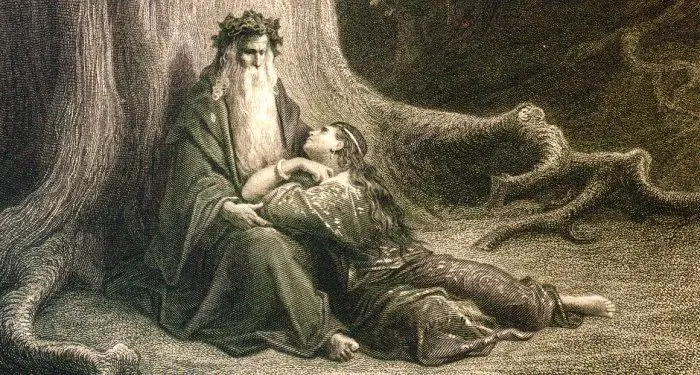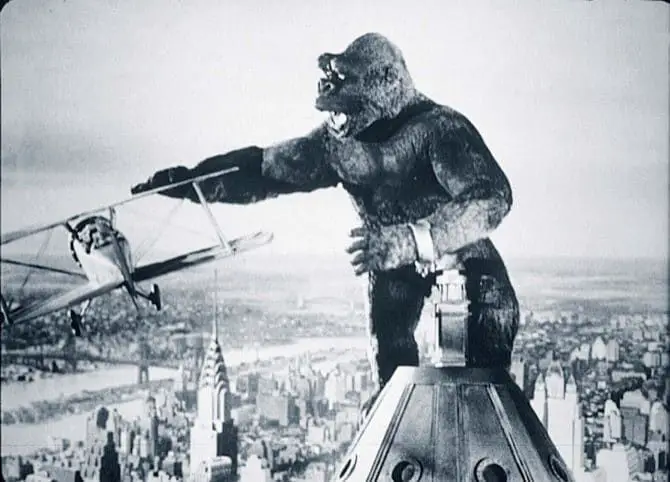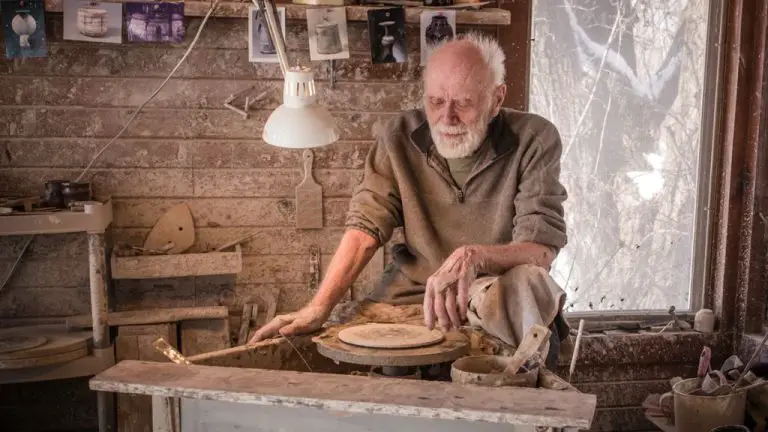Why Do British People Say Merlin’S Beard?
“Merlin’s beard!” is an exclamation used to express surprise, similar to “Good heavens!” in modern English. The phrase references the wizard Merlin, a legendary figure in medieval British folklore who was famous for his long, flowing beard. Merlin was a central character in the legends of King Arthur and Camelot, where he acted as Arthur’s advisor and court magician. In Arthurian stories and medieval art, Merlin’s long white beard was an iconic part of his appearance.
The exact origins of using “Merlin’s beard” as an exclamation are unclear, but it emerged as a uniquely British saying thanks to Merlin’s importance in English and Welsh legend. Today it endures as a quirky British idiom, most widely known from its use in J.K. Rowling’s Harry Potter novels. When characters like Hagrid and Ron Weasley exclaim “Merlin’s beard!” they are expressing surprise and invoking an important cultural and literary touchstone.
Merlin in Arthurian Legend
Merlin is a powerful wizard prominently featured in stories about King Arthur. According to Britannica, Merlin was known as “the most famous wizard of all time” in Arthurian legends and medieval romance stories from the 5th century onwards (Merlin | Arthurian Legend, Wizard, Druid – Encyclopedia Britannica).
In the legends, Merlin acts as King Arthur’s advisor and mentor. He uses his magical abilities to help Arthur gain the throne and establish the kingdom of Camelot. Merlin is depicted as orchestrating key events in Arthur’s rise to power, such as helping him obtain the legendary sword Excalibur (Merlin – Wikipedia).
While portrayed as a powerful wizard, Merlin’s magic does not provide invincibility. The legends often show Merlin’s wisdom and intellect as being just as important as his mystical abilities.
Merlin’s Distinct Appearance
In Arthurian legend, Merlin is often described as having a distinct physical appearance, most notably a long, white beard. According to some sources, Merlin’s long beard was seen as representing his advanced age and wisdom.
In many classic depictions of Merlin from medieval legends and stories, he is shown with a flowing, white beard that goes down to his waist or knees. For example, in some of the earliest known images of Merlin in a 15th century illuminated manuscript, he is pictured as an old man with a long, gray beard (British Library). His beard length is emphasised to highlight his elder status.
Later fictional works featuring Merlin also emphasise his long, white facial hair. In T.H. White’s The Sword in the Stone, Merlin is described as having a “long beard” and being “so old he might have been alive for centuries.” This distinctive beard became a key part of Merlin’s iconography and how he is recognised.
Some modern costumes and accessories reflect this imagery, featuring long, white beards and wigs to complete the Merlin look, such as items sold around Halloween (Amazon). Merlin’s beard is still seen as a signature part of his appearance.
Beards Seen as Wise
Throughout much of history, beards have been associated with wisdom and knowledge. In ancient Greek culture, philosophers like Socrates, Plato and Aristotle were often depicted with long, full beards, representing their status as wise thinkers (Beardpilot). The ancient Greeks believed a beard was a sign of an orderly mind and powerful intellect. In ancient Rome as well, philosophers, teachers and scholars were expected to have beards, which were symbols of education and expertise (Truefittandhill).
This association between beards and wisdom continued through the Middle Ages and Renaissance. Many religious teachers, professors and scribes had long beards to demonstrate their knowledge. The stereotype of the wise old man with a long, grey beard also emerged in this era. Even today, the beard remains associated with intellect, education and authority in many cultures.

Exclamations Using Beards
Beards have long been associated with wisdom and authority in many cultures. This has led to beard-related exclamations used to express surprise, frustration, or other emotions. According to a Reddit discussion, exclamations invoking beards have been common through history.
For example, the ancient Greeks would swear by the “beard of Zeus.” The Norse would invoke the “beard of Odin,” which continues today with exclamations like “Odin’s beard!” In Arthurian legend, Merlin’s long white beard represented his wisdom and power, leading to cries of “Merlin’s beard!”
Other creative beard-related exclamations invoke creative imagery, such as “By the eleven thousand hairs in Methuselah’s beard!” referring to the long-lived biblical figure. Over time, beard exclamations have become less common in everyday speech, but continue to be used humorously or in fiction as exaggerated expressions of surprise.
Beards in British Culture
Beards have had a long history in British culture, often reflecting prevailing fashions and cultural attitudes. In the Victorian era of the mid to late 1800s, beards grew in popularity after being out of fashion in the 1700s and earlier part of the 1800s. As the Victorian historian Thomas Carlyle wrote, “The age of beards has come.” [1] Popular beard styles included mutton chops, chin curtains, and full beards. The beard was seen as representing masculinity and wisdom.
Earlier in British history, beards had also been common among British men. In the 16th and 17th centuries, wearing a beard was popular during the reigns of Queen Elizabeth I and James I. However, by the late 1700s, being clean-shaven had become the new standard. As wigs also went out of fashion, cropped hair and a bare face were hallmarks of the British gentleman. [2]
In more modern times from the early to mid-20th century, being clean-shaven was the predominant norm, especially in white collar professions and business. However, since the 1960s and 70s, attitudes have relaxed, and beards have made a comeback in British culture. Today, British men have a wide diversity of facial hair styles, with beards no longer seen as unconventional. [3]
Merlin’s Beard Emerges
The exclamation “Merlin’s beard!” first appeared prominently in J.K. Rowling’s Harry Potter book series, which began publication in 1997. Though Merlin did not actually have a notable beard in the original Arthurian legends, Rowling portrayed him as having a long, white beard fitting a wizard. The phrase is uttered by many wizards in the Harry Potter universe to show surprise or shock.
According to research, there was one prior isolated use of the phrase “Merlin’s beard” found in a 1992 romance novel (An Impudent Lady) set in the Regency period, though it was not popularized until the Harry Potter books. Rowling seemingly invented it as a fictional wizarding exclamation. Since she never specifically commented on creating the phrase, its origins remain uncertain.
In Children’s Literature
“Merlin’s beard” has appeared in various British children’s books over the decades, becoming a common exclamation used by characters. According to this Reddit discussion, the phrase can be found in books like the Chronicles of Narnia series by C.S. Lewis and the Worst Witch stories by Jill Murphy.
More recently, J.K. Rowling has helped popularize “Merlin’s beard” through her Harry Potter books. As this article notes, Rowling is even working on a new children’s book where the phrase may make an appearance. Overall, the exclamation has become a staple in British children’s literature over time, often used to express surprise or annoyance.
In Harry Potter
The expression “Merlin’s beard” is used frequently by characters in the Harry Potter book and film series. As the stories center around a magical world, references to the legendary wizard Merlin are commonplace. Characters will exclaim “Merlin’s beard!” to express surprise, shock, or frustration.
For example, in Harry Potter and the Sorcerer’s Stone, Hagrid says “Merlin’s beard, Harry!” when he realizes Harry knows nothing about the wizarding world or his own fame (Harry Potter Wiki – Fandom). Later in the series, Ron Weasley cries “Merlin’s beard!” when he sees the extravagant Christmas decorations at Hogwarts (Reddit). The characters treat Merlin as an important historical wizard figure, so invoking his beard shows respect.
Overall, the use of “Merlin’s beard” throughout the Harry Potter series reflects how Merlin remains a cultural icon in the British wizarding world. His beard symbolizes his wisdom and commands respect when called upon in times of wonder or dismay.
Prevalence Today
The phrase “Merlin’s beard!” is still used today, especially among Harry Potter fans. It’s an expression of surprise, similar to saying “Oh my god!” or “Good heavens!” According to discussions on English language forums, using “Merlin’s beard” is a playful way to swear without actually swearing.
On Reddit and other social media sites, many Harry Potter fans use “Merlin’s beard” in a lighthearted way, just as the characters do in the books and movies. It allows them to immerse themselves in the magical world. Saying “Merlin’s beard” also shows other fans that they’re knowledgeable about the Harry Potter universe.
While “Merlin’s beard” originated in older legends and children’s books, it remains prevalent today thanks to continued Harry Potter fandom. It likely won’t completely replace more common interjections, but it persists as a fun and whimsical alternative.



